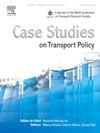Impact factors on level of participation in transport infrastructure technology development: The role of technology capability
IF 3.3
Q3 TRANSPORTATION
引用次数: 0
Abstract
Transport infrastructure plays a pivotal role in economic development by enhancing connectivity, resilience, and operational efficiency. However, stakeholder participation in transport infrastructure technology projects is often hindered by concerns over high costs, extended timelines, and uncertainty in outcomes. Therefore, this empirical research is carried out to study the impacts of technology-related factors on stakeholders’ participation in technology projects, which helps to mitigate the stakeholders’ concerns and encourages participation in such projects. Drawing on national innovation system theory and the demand-pull and technology-push framework, the research investigates the impact of three key enablers—technology capability, innovation input, and government incentives—on the level of stakeholder participation in transport infrastructure technology development. The results show that national technology capability has a direct positive relationship on stakeholder participation and mediates the indirect effects of innovation input and government incentives. High government support and sustained innovation efforts translate into stronger technological capability, which leads to a higher level of participation, implying the technology-related factors’ ability to mitigate risk and improve feasibility to stakeholders. High relations are also found between government incentives and innovation input. The research has significance in exploring transport infrastructure development from a novel technology-related perspective, which could provide policy implications for policymakers and decision support for investors when participating in projects to progress the transport infrastructure technology level.
交通基础设施技术开发参与水平的影响因素:技术能力的作用
交通基础设施通过增强连通性、韧性和运营效率,在经济发展中发挥着关键作用。然而,利益相关者对交通基础设施技术项目的参与往往受到对高成本、延长时间表和结果不确定性的担忧的阻碍。因此,本文进行实证研究,研究技术相关因素对利益相关者参与技术项目的影响,有助于缓解利益相关者的担忧,鼓励他们参与技术项目。利用国家创新系统理论和需求拉动和技术推动框架,研究了技术能力、创新投入和政府激励这三个关键因素对交通基础设施技术开发中利益相关者参与水平的影响。结果表明,国家技术能力对利益相关者参与具有直接的正相关关系,并在创新投入和政府激励的间接影响中起中介作用。较高的政府支持和持续的创新努力转化为更强的技术能力,从而导致更高的参与水平,这意味着技术相关因素能够降低风险并提高利益相关者的可行性。政府激励与创新投入之间的关系也很密切。本研究从全新的技术视角探索交通基础设施发展,为政策制定者提供政策启示,为参与项目的投资者提供决策支持,提高交通基础设施的技术水平。
本文章由计算机程序翻译,如有差异,请以英文原文为准。
求助全文
约1分钟内获得全文
求助全文

 求助内容:
求助内容: 应助结果提醒方式:
应助结果提醒方式:


